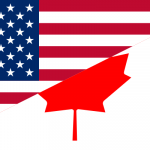Are Trump’s Steel Tariffs Unconstitutional?
 The Trade Expansion Act of 1962 gives President Trump the legal right to impose tariffs at his discretion if he determines there’s a national security threat to justify it. Therefore, when the president exercised that right by imposing 25% tariffs on steel imports (which he did along with 10% tariffs on aluminum) under the justification of national security, he was within his legal rights.
The Trade Expansion Act of 1962 gives President Trump the legal right to impose tariffs at his discretion if he determines there’s a national security threat to justify it. Therefore, when the president exercised that right by imposing 25% tariffs on steel imports (which he did along with 10% tariffs on aluminum) under the justification of national security, he was within his legal rights.
But is that legal right unconstitutional?
The American Institute for International Steel (AIIS) and two of its member companies, Sim-Tex LP and Kurt Orban Partners LLC, say yes.
AIIS, Sim-Tex LP, and Kurt Orban Partners LLC filed a lawsuit challenging the constitutionality of Section 232, the statute within the Trade Expansion Act of 1962 that gives the president the legal right in question.
According to an article by Chris Dupin in American Shipper, the lawsuit not only seeks to declare Section 232 unconstitutional but also seeks a court order to stop further enforcement of Trump’s tariffs on steel. They filed the suit Wednesday (June 27th) in the United States Court of International Trade in New York City.
Obviously, President Trump’s tariffs have met much opposition. We just blogged on Tuesday about the European Union’s retaliatory tariffs followed by President Trump’s threat to throw new tariffs on U.S. imports of EU cars and the EU’s promise to match that with more retaliation putting the U.S. and EU on the verge of a trade war.
However, one of the interesting things about the lawsuit challenging the constitutionality of the president’s tariffs is that it does not criticize Trump. The lawsuit points at Congress as the ones who acted unconstitutionally.
Dupin reports:
Alan Morrison, lead counsel for the plaintiffs, said, “Unlike most cases brought against actions of the Trump administration, it is Congress — through its delegation of unfettered discretion to the president in this statute — and not the president that is the violator of the Constitution. The president simply took advantage of the opportunity to impose his views on international trade on the American people, with nothing in the law to stop him.”
The plaintiffs’ argument, as Dupin’s article presents it, is that Congress, with Section 232, delegates its legislative powers to the president without any “intelligible principle” to limit the president’s discretion, which violates both the doctrine of separation of powers and the system of checks and balances protected by the Constitution.
When President John F. Kennedy signed this act into law, he said, “This is the most important international piece of legislation, I think, affecting economics since the passage of the Marshall plan.”
The Marshall Plan was a program where the U.S. aided Western European countries in rebuilding their economies after World War II from 1948 to 1952.
Ready for some irony?
When JFK — who worked hard to get this bill passed, even calling it his number one priority — signed the Trade Expansion Act of 1962, he spoke of how this legislation was to lower tariffs while highlighting the benefits of doing so:
This act recognizes, fully and completely, that we cannot protect our economy by stagnating behind tariff walls, but that the best protection possible is a mutual lowering of tariff barriers among friendly nations so that all may benefit from a free flow of goods.
A little more than half a century later, JFK’s top priority bill is raising controversy as its being used to do the opposite of what he wanted to use it for.
There’s an article from the Washington, DC: Congressional Quarterly, 1963 that ends with the following portend about the Trade Expansion Act of 1962:
According to most observers, the moments of truth are yet to come. For the Trade Expansion Act of 1962 is an instrument, a set of authorities, within which to shape U.S. trade policies. The true shape will be determined at the negotiating table and in the White House, which must decide how much to protect domestic industries.
It’s almost eerie to see prophecy fulfilled from over fifty years ago as those moments of truth come to pass.
A big moment of truth is coming with this lawsuit as its plaintiffs eye the Supreme Court. Perhaps it will be decided that the truth is it’s unconstitutional for the White House to decide how much to protect domestic industries.




